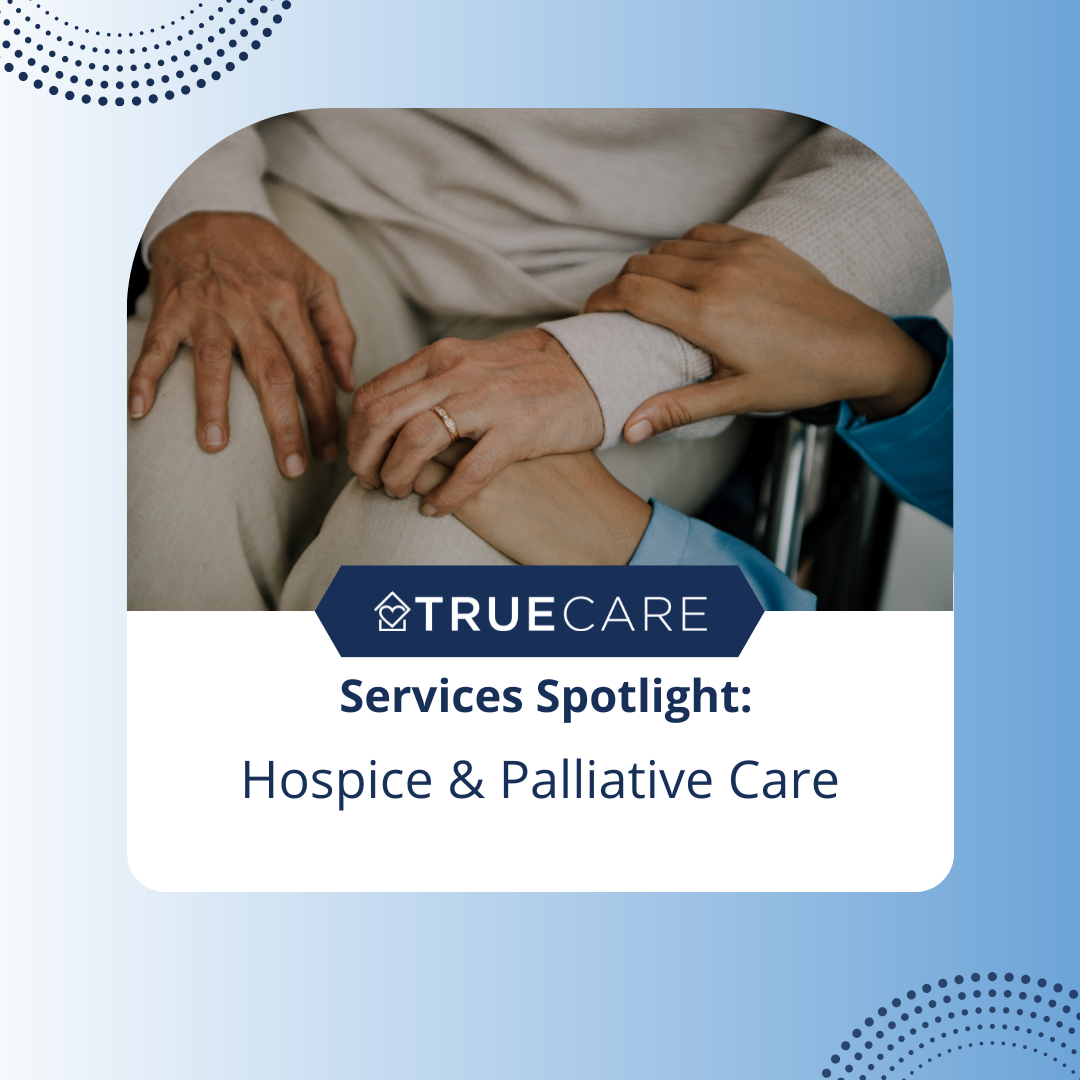Every day is precious, especially when your loved one is living with a life-limiting illness. They may need specialized care and support that can only be offered by medical professionals, and may also wish to stay at home during their last days, weeks, or months. It's important for older adults to plan ahead and let their caregivers, doctors, or family members know their end-of-life preferences in advance. If the person is no longer able to make healthcare decisions for themselves, a caregiver or family member may have to make those decisions.
Caregivers have several factors to consider when choosing end-of-life care, including the person's desire to pursue life-extending treatments, prognosis, and the preferred setting for care. When deciding the kind of home health care necessary, caregivers may likely be choosing between Hospice Care, Palliative Care, or both. Read along for a better explanation of both types of care, and get a closer look into True Care’s Hospice and Palliative care services.
Hospice vs Palliative Care
Palliative care and hospice care are both specialized types of medical care that are focused on improving the quality of life for individuals with serious and/or life-limiting illnesses. While the two are closely related, there are subtle yet distinct differences between the two.
Hospice care is a specialized type of care that is intended for individuals who are facing a life-limiting illness and are no longer pursuing curative treatment. The goal of hospice care is to provide comfort, dignity, and emotional support to clients and their families during this challenging time. Hospice care can be provided in the client’s home, a nursing home, or a hospice facility, and typically includes:
- pain management
- symptom control
- emotional and spiritual support
Palliative care, on the other hand, is a type of care that is intended for individuals who are living with a serious illness but are still pursuing curative treatment. The goal of palliative care is to improve the client’s quality of life by managing symptoms, providing emotional support, and helping clients and families make informed decisions about their care. Palliative care can be provided in a variety of settings, including hospitals, nursing homes, and at home.
Palliative care can be provided at any stage of an illness and is appropriate for individuals of any age, from young children to much older patients. Its purpose is to provide relief from the symptoms, pain, and stress that can be associated with a serious illness, while also providing emotional and spiritual support to patients and their families. Unlike Hospice care, Palliative care can be provided alongside curative treatment and is not limited to end-of-life care. Hospice care focuses on managing symptoms while also providing emotional and spiritual support to patients and their families during the end-of-life process.
Which should I choose?
Patients who are seeking palliative care may have a wide range of illnesses, including:
- cancer
- heart disease
- respiratory diseases
- neurological diseases
- chronic conditions such as diabetes or kidney disease
Palliative care can also be appropriate for individuals who are undergoing treatment for a serious illness, but are experiencing symptoms such as pain, nausea, or fatigue that are impacting their quality of life.
Patients who are seeking hospice care, on the other hand, are typically in the final stages of a life-limiting illness and have a life expectancy of six months or less. Hospice care is appropriate for individuals who are no longer seeking curative treatment and are focused on managing symptoms like pain and anxiety and improving quality of life during the end-of-life process.
True Care’s Hospice & Palliative care services:
When a loved one is facing a life-limiting illness, True Care Hospice and Palliative Care personnel are carefully trained to create an all-around supportive experience they can depend on through each stage of life’s journey. Our caregivers step in with expert care and guidance, delivering ongoing comfort and healthcare assistance. Our Hospice support is a deeply personal, highly sensitive care program with your loved-ones needs and preferences at the center of everything we do.
Acting as a liaison between primary care providers and families, our hospice team delivers continuous emotional support among other end-of-life services for clients and their families including:
- Specialized care plans
- Comfort management
- Spiritual counseling
- Respite care
- One-on-one meetings
- Supportive phone calls
- Grief counseling
Our team of the finest hospice Nurses and specialty-trained Caregivers work tirelessly to bring their expertise into the home setting. With True Care Hospice and Palliative care services, clients can welcome home a reassuring presence that helps ease the burden of the day-to-day and supports the entire family.
Summing it up:
Overall, while there are similarities between palliative care and hospice care, the two types of care are distinct and are appropriate for different types of patients at different stages of illness. To inquire about which services are best for you or a loved one, or to request services, visit our website and use our convenient inquiry and services request tools or call us at (718)-854-8783.




